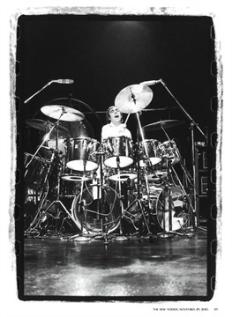Author James Wood recently wrote a worthy expose' reflecting on the one-and-only Keith Moon of The Who. Not only was it so well-written, but Wood really nails the role of the drummer in a rock band, in general, and what made Moon so special, in particular:
The Who had extraordinary rhythmic vitality, and it died when Keith Moon died, thirty-two years ago. Pete Townshend's hard, tense suspended chords seem to scour the air around them; Roger Daltrey's singing was a young man's fighting swagger, an incitement to some kind of crime; John Entwistle's incessantly mobile bass playing was like someone running away from the scene of the crime; and Keith Moon's drumming, in its inspired vandalism, was the crime itself. Moon was the drums not because he was the most technically accomplished of drummers but because his joyous, semaphoring lunacy suggested a man possessed by the antic spirit of drumming. He was pure, irresponsible, restless childishness.
Yes!
He goes on in detail (as summarized at the New Yorker website):
Most rock drummers, even very good and inventive ones, are timekeepers. There is a space for a fill or a roll at the end of a musical phrase, but the beat has primacy over the curlicues. Keith Moon ripped all this up. There is no time-out in his drumming, because there is no time-in. It is all fun stuff. The first principle of Moon's drumming was that drummers do not exist to keep the beat. He did keep the beat, and very well, but he did it by every method except the traditional one. No two bars of Moon's playing ever sound the same; he is in revolt against consistency. Everyone else in the band gets to improvise, so why should the drummer be nothing more than a condemned metronome? He saw himself as a soloist playing with an ensemble of other soloists.
And also when he compares Moon with Led Zepplin's John Bonham:
Bonham's drumming sounds as if he'd thought about phrasing; he never overreaches, because he seems to have so perfectly measured the relationship between rhythmic order and rhythmic deviation. His superb but tightly limited breaks on the snare and his famously rapid double strokes on the bass drum are constantly played against the unvarying solidity of his high hat, which keeps a steady single beat throughout the bars. (In a standard 4/4 bar, the high hat sounds the four whole beats, or perhaps sounds eight beats in eighth notes). That is "the Bonham sound," heard in the celebrated long solo - one of devilish intricacy - in "Moby Dick," on the live album "The Song Remains the Same." Everything is judged, and rightly placed: astonishing order. Moon's drumming, by contrast, is about putting things in the wrong place: the appearance of astonishing disorder. You can copy Bonham exactly; but to copy Moon would be to bottle his energy, which is much harder.
Don't miss this fantastic article about the inestimable Keith Moon!
Note: you can download the entire article by clicking on the photo below if you don't have a New Yorker subscription. ENJOY!
Permalink to post: http://www.cslproductions.org/music/talk/archives/001123.shtml
Receive an email whenever this MUSIC blog is updated: Subscribe Here!
Tags: Keith Moon, rock drummer, rock drumming, The Who
I read his biography, despite his condition he has talent in music as a drummer. The band (The Who) never leave him although he used to be in danger blowing up hotel's toilet, throwing furniture outside the window etc. Thanks for sharing.
guitar for beginners
home | music | democracy | earth | money | projects | about | contact
![]() Site design by
Matthew Fries | ©
2003-23 Consilience Productions. All Rights Reserved.
Site design by
Matthew Fries | ©
2003-23 Consilience Productions. All Rights Reserved.
Consilience Productions, Inc. is a 501(c)(3) non-profit organization.
All contributions are fully tax deductible.





